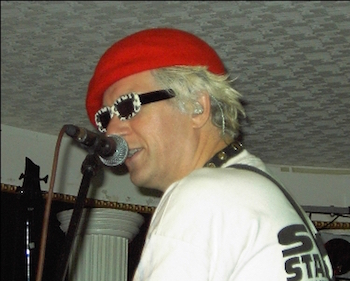Arts Interview: Editor Erin Amar on 5 Years of “Rocker” — A Zine for “Rockers of a Certain Age”
“I was seeing that there were these musicians still putting out fantastic records – sometimes some of their best work – but because of their age, they weren’t getting much attention.”

“Rocker”‘s mascot – the “Rockin’ Gram.”
By Brett Milano
Like youth itself, rock & roll is often wasted on the young. There’s always been plenty of media out there for aging rock fans — who else has been demanding that radio still plays “Life in the Fast Lane” every 20 minutes? Lost in the shuffle, however, are rockers who’ve made it to a certain age without losing their taste, the ones who are still looking to absorb new music by career mavericks like Robyn Hitchcock, Stephin Merritt, Sparks and the Stranglers.
That’s where the locally-based online magazine Rocker comes in. Conceived in 2011 as a zine for “rockers of a certain age,” Rocker is discerning about what it covers and thoughtful and witty about how it does. Credit that to the sensibility of founder Erin Amar, a veteran of the local rock wars who’s brought impeccable style to everything she does. Browsing the Rocker site reveals a recent trove of gems: A typically far-ranging chat with Robyn Hitchcock; a review of a latter—day Alarm tour by local musician Steve Prygoda of My Own Worst Enemy; and the only South by Southwest wrapup that dares to suggest “You’re Getting Too Old for This Shit” (but urges you to go anyway). Oh, and an appreciation of Glen Campbell that I found myself nodding in agreement with, before realizing that I actually wrote it three years ago. Such are the rewards of longevity.
I sat down with Erin Amar to talk about Rocker and its five years online:
Arts Fuse: So what led to the decision to focus on music for a certain demographic of rock & rollers? Did you feel that, say, rockers over 40 were being ignored by the music media that’s out there?
Erin Amar: Well, I think we all are pretty aware that once rock and pop musicians are over, say 30 or 35, their careers are often considered “over.” I mean, there are of course there are exceptions, people who were able to build a giant career before that, your Madonna’s or Rush or whatnot, but for the majority of rock artists, yes, it’s pretty evident that even if they’ve enjoyed moderate success, they hit a sell-by-date and their output is mostly ignored after that.
I had been a music writer for about 15 years when I started Rocker in 2011, and I was seeing that there were these musicians still putting out fantastic records – sometimes some of their best work – but because of their age, they weren’t getting much attention. Meanwhile, I also became aware that there were fans of these people who had no idea that their old favorites were still touring and recording. So I thought initially of Rocker as a conduit to put these two things together, basically legacy artists with legacy fans. Though it seems ridiculous to call some of these people “legacy” since they’re maybe in their early 40s — they’re hardly old. And in any other type of music – jazz, classical, blues – their age wouldn’t be seen as an impediment to their career. It’s just straight up ageism. Rock and Roll as a musical form is only 60-ish years old itself, it’s still evolving, so maybe with Rocker I’m trying to speak to a group of fans and artists who very much exist, but have few outlets in which to be seen.
AF: How do you define which music falls in Rocker’s domain? I get the sense that you’re particular (quirky and good!) taste in music plays into this somehow?
Amar: Aw thanks! It does have to do with my own personal taste (hey, that’s what being the editor is about, right?) as well as things that our writers bring to me that they are excited about, or things that I see our readers want to hear more about on social media. A mix. But the overall guidelines are we are focused on the work of rock / pop musicians 35-40+, with past successes, who continue to tour and record, as well as stories that are relevant to rock music fans of that age – style, health, etc. I didn’t want Rocker to just be a nostalgia website, there is plenty of that already. There’s always room to look back at music history, but I like to keep the focus on creatives who are still active in their musical careers, and encouraging fans to keep up with them.
Every time I tell someone “I’m sorry, you’re too young to be in our publication” I’ll confess I get a little giddy. That’s ageism too I guess, but as I often say, everybody will eventually be old enough to get written about in Rocker. It’s an exclusive club for now, but everyone gets admission eventually. We’re a niche publication, and that’s OK. You can’t feature a bunch of dogs in Cat Fancy you know?
AF: You recently ran a long retrospective on the hallowed Boston club the Rat. Are you one of those jaded Boston scenesters who think the local music world will never be what it used to be?

“Rocker” editor Erin Amar: “Going out to see live music is a really healthy thing for people to do, and as people age they often move away from it, but I think it should get re-prioritized.”
Amar: No, not at all. I really was inspired to do that piece because I am on a Facebook group about the Rat and people were telling some of the most hilarious stories about things that happened to them there, and I thought “Wow, these stories deserve a bigger audience,” so I messaged some of the people and asked if I could use their stories in an article. Most were very excited to be asked!
Nightclubs can be a really magical place because they’re where music happens. That sounds so simplistic to say, but because music moves people on a primal level, it can become a very spiritual or emotional thing. I’m sure you wouldn’t be surprised if I told you many studies show listening to music is one of the most effective ways to elevate your mood. The other is “spending time with friends” – and seeing live music offers both of those things. Kari Krome (of the Runaways) allowed us to run a piece of hers talking about her young memories of going to Rodney Bingenheimer’s English Disco in the early ‘70s, and it does a great job of getting to the heart of how nightclubs can be a sacred space for those who inhabit them, where they find inspiration, belonging, and release. If anything I’ve come to feel strongly about after helming Rocker for 5 years, it’s that going out to see live music is a really healthy thing for people to do, and as people age they often move away from it, but I think it should get re-prioritized.
AF: Rocker’s wonderfully irreverent piece on South by Southwest was one of the most-shared things I saw on Facebook the day it hit. Is it part of Rocker’s mission to (good naturedly of course) give jabs to some of the music world’s sacred cows?
Amar: I have to say, I was blown away at the fantastic job Scott VonDoviak did with that assignment. I was laughing out loud when I got it in. He’s a very talented guy, and the author of some great books on film and we’re ridiculously lucky to have him as our Austin correspondent.
I think what really connected with so many people about that piece is that Scott had the boldness to tell it like it is, in a way most “hip” “rock” publications are way too precious to ever do. But that’s kind of the beauty of maturity, if you’re doing it right, you care less and less what other people think – you just are who you are. And really, that’s very punk rock.
So I don’t know if it’s part of the mission of Rocker to tazer the sacred cows, but I do like that we’re able to unapologetically come from a different perspective in pieces like that, and in our interviews too. I like Rocker as a safe space for both musicians we spotlight and our readers, to not have to apologize for who they are. It allows Rocker to present something that’s sadly uncommon — namely positive images of vibrant, creative, and engaged adults, working on their craft or just enjoying the simple pleasures of a night out at a rock show.
AF: A couple of my favorite Rocker interviews are with artists who are no longer with us — Kim Fowley and Scott Miller. In both cases, you did one of the artist’s last interviews. How does it feel now to go back and read these?
Amar: I’d be lying if I didn’t say it made me sad. Although I’ve been writing about music for a long time, until I started Rocker I hadn’t interviewed anyone who passed away, and Scott Miller was someone I had interviewed many times in his career — starting around 1988 through until just before his death. He was one of my favorite musicians and we had a friendly relationship, so, it definitely makes me sad. But at the same time I had to realize that, in many cases, without Rocker many of these people would not have had a final interview. And that would have been much sadder.
I got to interview Marty Thau, who was the manager of the New York Dolls and owner of the Red Star Records label that released early singles from the Fleshtones and Blondie in the ‘70s. He contacted me about wanting to tell his story, so we did two, one about the Fleshtones, and one about his time with the Dolls. When the latter ran he got really upset with me, I think because he felt more exposed than he was comfortable with, because I quoted him saying that when the Dolls broke up it kind of broke his heart. He softened up once people began commenting on the article about how much they liked it. He passed away in 2014 and Rocker was referenced as one of the final interviews he did, and I was glad the piece told a bit more about who he really was.
So in the end, though it’s sad, I do feel honored that Rocker could give some of these people some of their final places to tell their story. It makes you feel you’re really doing something more than just running a little website; that you’re doing something important.
AF: Who would the dream interview for Rocker be? Have there been any memorable near-misses?
Amar: It’s hard to answer this because I have already gotten to interview so many people who I can’t believe said yes to us!
My most regrettable near miss was Poly Styrene from X Ray Spex. She put out a new record in 2011 and I had my questions all written up, we were just trying to find a time for the interview when she died. Talk about the hazards of this reporting beat!
Probably, my dream interview would be Tom Jones. He really is just sensational in every way, from the ’60s right up to modern times. I really admire that he just keeps teaming up with younger musicians and putting out really relevant contemporary music that still is very much Tom Jones.
AF: When you interviewed the Damned, you made it into their movie. Who have your most memorable encounters been with?

Captain Sensible of the Damned in action.
Amar: The Damned were definitely amazing. Captain Sensible might be my favorite person I have ever interviewed. He was so funny and self-possessed, and very honest about the early days of punk rock not being very glamorous at all, while also being very inspiring about “keeping it real.” He’s just the kind of person I’d like to hang around with all day long.
I’m finding myself at a loss as try to pick who was more memorable than others. They were all so cool! In my career as a writer, the interviews I have done for Rocker have been some of the most enjoyable I’ve done, because the people I meet are invariably complex individuals who have had great ups and downs in their creative lives and often have really intelligent and interesting perspectives to offer on life. They really inspire me, and I hope that our readers come away with that feeling too.
AF: You say on the site that you want readers to redefine what “aging gracefully” means to them. Can you talk more about that, and what it means to you?
Amar: Well, Captain Sensible of the Damned advocates “Aging disgracefully” and I now think I’m with him.
I think I have to bag out of this question, I can’t quite figure out what to say. The topic is too big!
AF: It’s often said that people never get over whatever music they loved when they were 20 — Like, there must be a reason I still hold onto all three Bram Tchaikovsky albums. Why do you think that’s so?
Amar: Well, music is really powerful in the way it can bring you back to a time and a place when that song was playing, just like a smell or a taste, music is where our ears make the most out of hearing, making it into more than just information. I once read this quote, and I wish I remember who said it, but it was about how heavy metal music is often accused of driving kids to suicide and this metal person was saying “Nobody listens to heavy metal to feel hopeless, metal makes you feel strong” and I think that’s right.
So on one hand we can listen to music that was there at important junctures in our life and feel nostalgia, but maybe more importantly we can use it to reconnect to our essential selves, connect to who you are at heart outside of your job, your kids, your mortgage, your aching back, and use that to remind you of who you are at your core, at your positive best, and use that in your life moving forward.
Or you can just listen to it because “Girl of My Dreams” is a freakin’ great song!
Brett Milano has been covering music in Boston for decades, and is the author of Vinyl Junkies: Adventures in Record Collecting (St. Martins, 2001) and The Sound of Our Town: A History of Boston Rock & Roll (Commonwealth Editions, 2007). He recently returned from New Orleans where he was editor of the music and culture magazine OffBeat. His latest book is Don’t All Thank Me At Once (125 Records), a biography of the unsung pop genius Scott Miller, who led the bands Game Theory and The Loud Family.
Tagged: Brett Milano, Captain Sensible, Erin Amar, Rocker, Rockerzine
